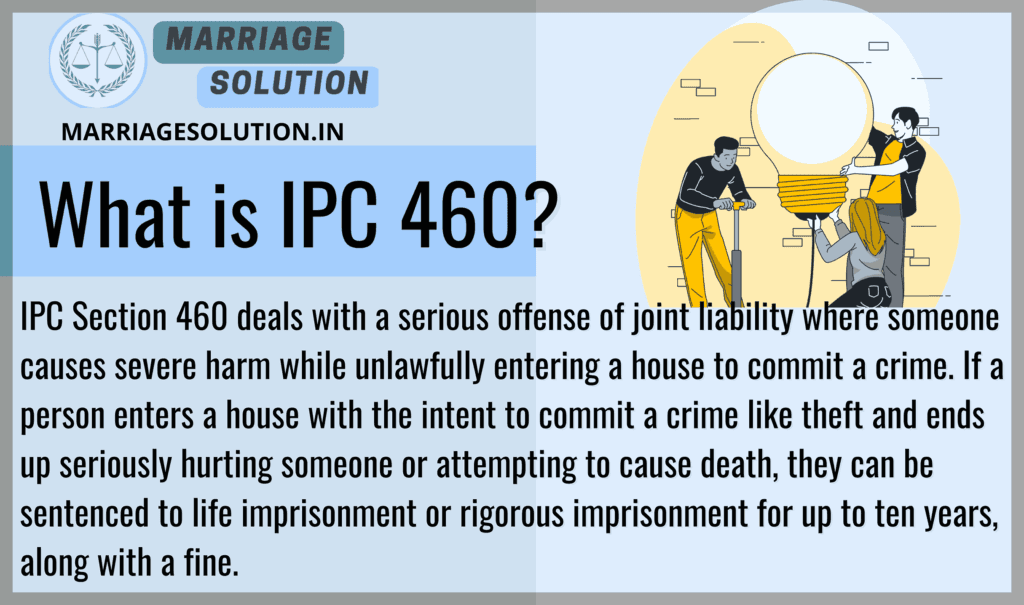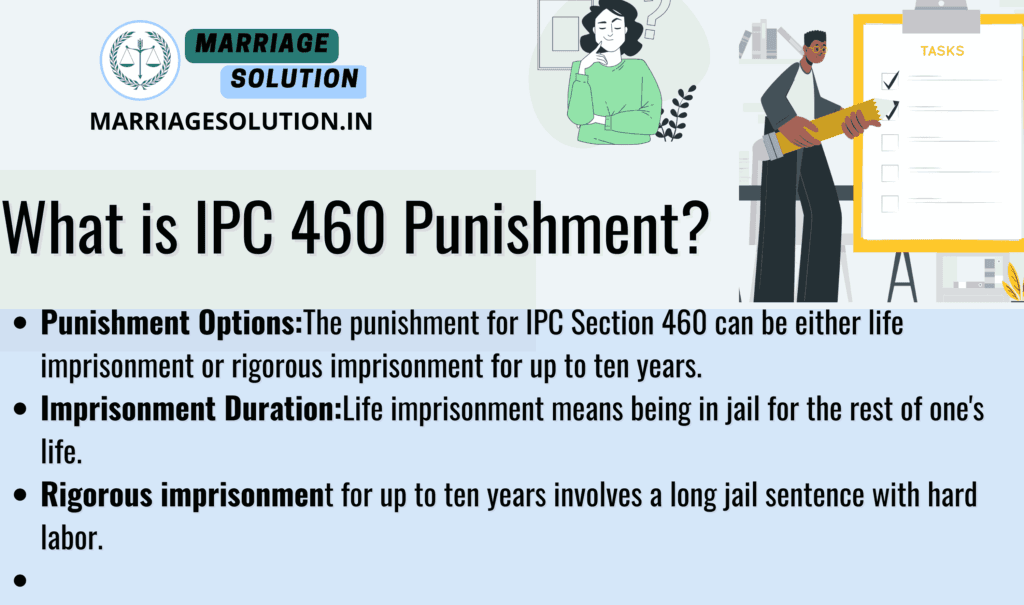Introduction of IPC Section 460
IPC Section 460 deals with a serious crime where someone causes severe harm while unlawfully entering a house to commit a crime. If a person breaks into a house with the intention of stealing and ends up seriously hurting someone or trying to cause death, they can face life imprisonment or up to ten years of rigorous imprisonment, along with a fine. This law aims to punish individuals who commit serious crimes while trespassing into homes.
- Introduction of IPC Section 460
- What is IPC Section 460 ?
- IPC Section 460 Overview
- IPC 460 Punishment
- 460 IPC bailable or not bailable ?
- Section 460 IPC in short information
- IPC Section 460 FAQs
- If you need support with court proceedings or any other legal matters, don’t hesitate to reach out for assistance.
What is IPC Section 460 ?
IPC Section 460 deals with a serious offense of joint liability where someone causes severe harm while unlawfully entering a house to commit a crime. If a person enters a house with the intent to commit a crime like theft and ends up seriously hurting someone or attempting to cause death, they can be sentenced to life imprisonment or rigorous imprisonment for up to ten years, along with a fine.

IPC Section 460 Overview
IPC Section 460 talks about a serious crime where someone causes serious harm while breaking into a house. If, while breaking in, they hurt someone badly or try to kill them, they can get life in prison or up to ten years in rigorous imprisonment, plus a fine.
IPC 460: 6 Key Points
- Serious Crime: This crime involves causing serious harm or trying to kill someone while breaking into a house.
- Breaking In: The crime happens when someone breaks into a house, either during the day or at night.
- Intent: The person must have intended to commit a crime that could lead to imprisonment.
- Punishment: The punishment for this crime can be life imprisonment or up to ten years in rigorous imprisonment, along with a fine.
- No Bail: This is a non-bailable offense, meaning the accused can’t easily get bail.
- Seriousness: This crime is very serious because it involves hurting or trying to kill someone while breaking into their home, which puts lives in danger.
IPC 460 Punishment
- Punishment Options:
- The punishment for IPC Section 460 can be either life imprisonment or rigorous imprisonment for up to ten years.
- Imprisonment Duration:
- Life imprisonment means being in jail for the rest of one’s life.
- Rigorous imprisonment for up to ten years involves a long jail sentence with hard labor.
- Fine:
- In addition to imprisonment, the convicted person may also face a fine as part of the punishment.

460 IPC bailable or not bailable ?
IPC Section 460 is a non-bailable offense, which means that if someone is accused of committing this offense, they cannot claim the right to be released on bail as a matter of right. Bail eligibility would depend on the discretion of the court and the circumstances of the case.
Section 460 IPC in short information
| Aspect | Explanation |
|---|---|
| Definition | IPC Section 460 addresses a serious crime involving (joint liability) causing grievous harm during house-trespass or house-breaking to commit another punishable offense. |
| Offense | This offense occurs when someone unlawfully enters a house with the intent to commit a punishable offense and causes grievous harm or attempts to cause death. |
| Punishment | The punishment for IPC Section 460 is either imprisonment for life or rigorous imprisonment for up to ten years, along with a fine. |
| Bailability | IPC Section 460 is a non-bailable offense, meaning the accused cannot claim bail as a matter of right. Bail eligibility is determined by the court. |
IPC Section 460 FAQs
What does IPC 460 address?
IPC 460 addresses the serious offense of causing grievous harm while unlawfully entering a house to commit a crime.
What constitutes a crime under IPC 460?
A crime under IPC 460 occurs when someone unlawfully enters a house with the intention of committing theft and ends up causing severe harm or attempting to cause death.
What are the potential consequences of committing a crime under IPC 460?
The consequences may include life imprisonment or rigorous imprisonment for up to ten years, along with a fine.
Is IPC 460 a bailable offense?
No, IPC 460 is a non-bailable offense, meaning the accused cannot claim the right to be released on bail as a matter of right.
If you need support with court proceedings or any other legal matters, don’t hesitate to reach out for assistance.
Court or any other marriage-related issues, our https://marriagesolution.in/lawyer-help-1/ website may prove helpful. By completing our enquiry form and submitting it online, we can provide customized guidance to navigate through the process effectively. Don’t hesitate to contact us for personalized solutions; we are here to assist you whenever necessary!
